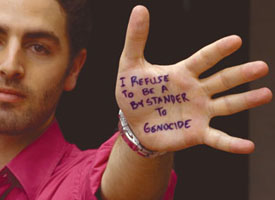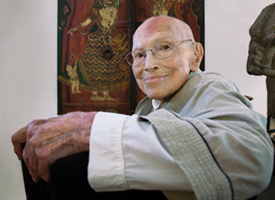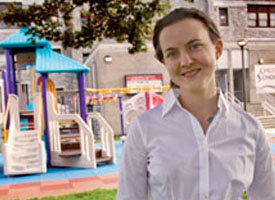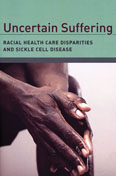Features
In the Face of Genocide
By Katie Becker ’10
 The grandchild of four Holocaust survivors, Mark Hanis ’05 grew up in Quito, Ecuador, where he attended synagogue—the only one in the country—in a community that included other survivors. Showing the numbers tattooed on their arms, the elders told the temple’s children to never forget and never let the atrocities of genocide happen again. Hanis took them at their word and has held firm to their injunctions ever since.
The grandchild of four Holocaust survivors, Mark Hanis ’05 grew up in Quito, Ecuador, where he attended synagogue—the only one in the country—in a community that included other survivors. Showing the numbers tattooed on their arms, the elders told the temple’s children to never forget and never let the atrocities of genocide happen again. Hanis took them at their word and has held firm to their injunctions ever since.
When he was a student at Swarthmore, the edicts of his elders, combined with the notion of ethical intelligence that imbues campus life, compelled Hanis to spend spring semester 2003 in Sierra Leone, where he helped the Special Court there indict Charles Taylor, warlord and former president of Liberia, for crimes against humanity during the Liberian civil wars. Back on campus, one evening, Hanis read about the genocide in Darfur. Already familiar with mass killing and its consequences, Hanis says he could not sit passively by and let it happen again, no matter how far away these atrocities were occurring.
Features
Breaking Down Barriers
By Elizabeth Redden ’05
 Founded in 2005 by Katie Chamblee ’07, the Village Education Project covers the costs of a high school education, on average about $200 per year, for students from six Ecuadorean villages. Here, in the largely indigenous villages outside Otavalo—a colorful market town about 50 miles north of Quito that is frequented by tourists—schools cling to the sides of mountains. Against the soft green creases of the Andes, snow-capped Volcán Cayambe looms. Here, fathers work mainly as day laborers, farming the surrounding haciendas; large families live on little.
Founded in 2005 by Katie Chamblee ’07, the Village Education Project covers the costs of a high school education, on average about $200 per year, for students from six Ecuadorean villages. Here, in the largely indigenous villages outside Otavalo—a colorful market town about 50 miles north of Quito that is frequented by tourists—schools cling to the sides of mountains. Against the soft green creases of the Andes, snow-capped Volcán Cayambe looms. Here, fathers work mainly as day laborers, farming the surrounding haciendas; large families live on little. Features
Beyond the Emotional Turmoil
By Susan Cousins Breen
 The need to know what makes a person gay and to understand how to live as a gay man without suffering emotional turmoil has been a driving force in psychiatrist Bertram Schaffner’s life. For the past 60 years, the renowned physician has been in the forefront of historic developments for gays and lesbians.
The need to know what makes a person gay and to understand how to live as a gay man without suffering emotional turmoil has been a driving force in psychiatrist Bertram Schaffner’s life. For the past 60 years, the renowned physician has been in the forefront of historic developments for gays and lesbians. Features
It’s Getting Better All the Time
By Jeffrey Lott
 It couldn’t get much worse.
A few weeks into her new job teaching first grade at the Chester Upland School of the Arts (CUSA) in fall 2008, Sara Posey could barely force herself to drive to work. “I felt ill, physically ill. I thought the whole school project that I was so hopeful about and so passionate about was turning into a disaster,” she told me months later. It didn’t turn out to be a disaster, but neither was it easy for Posey, who cares deeply about her teaching.
It couldn’t get much worse.
A few weeks into her new job teaching first grade at the Chester Upland School of the Arts (CUSA) in fall 2008, Sara Posey could barely force herself to drive to work. “I felt ill, physically ill. I thought the whole school project that I was so hopeful about and so passionate about was turning into a disaster,” she told me months later. It didn’t turn out to be a disaster, but neither was it easy for Posey, who cares deeply about her teaching.
Features
Now That’s Intertainment
 Television is so 20th century! The advent of Internet video has opened entirely new channels for send-up acts such as God's Pottery and the Gregory Brothers, each of which offers its own take on the music, media, and mores of our day.
Television is so 20th century! The advent of Internet video has opened entirely new channels for send-up acts such as God's Pottery and the Gregory Brothers, each of which offers its own take on the music, media, and mores of our day.
Related Articles
Collection

- Awe, Joy, and an Intense, Rewarding Adventure
- Board Lowers Budget Adjustment Target to $8 Million
- First There Was Collection—Now There’s First Collection
More collection articles from this issue
Faculty Expert
Preventing Teen Depression
By Jane Gillham
 Depression is one of the most prevalent psychological disorders and, as such, it is an important target for prevention efforts. Recent research has identified several risk factors for depression, including genetic vulnerabilities, family conflict, traumatic life experiences, pessimistic cognitive styles, and elevated depressive symptoms, which has paved the way for a wide range of prevention programs.
Depression is one of the most prevalent psychological disorders and, as such, it is an important target for prevention efforts. Recent research has identified several risk factors for depression, including genetic vulnerabilities, family conflict, traumatic life experiences, pessimistic cognitive styles, and elevated depressive symptoms, which has paved the way for a wide range of prevention programs.
Books + Arts
An Ethnography of Sickle Cell Disease
 Uncertain Suffering is an ethnography—the study of a people. Most of us assume that “a people” are bound together by geographic space or tradition, filial or religious ties. The people of Rouse’s study are bound by their association with sickle cell disease (SCD), whether they have the disease, are related to persons that have it, or treat it.
Uncertain Suffering is an ethnography—the study of a people. Most of us assume that “a people” are bound together by geographic space or tradition, filial or religious ties. The people of Rouse’s study are bound by their association with sickle cell disease (SCD), whether they have the disease, are related to persons that have it, or treat it.
In My Life
My Layer-Cake Life
By Malka Kramer Schaps ’69 (formerly Mary Elizabeth Kramer)
 What has been pushing my professional life can be summed up in a single sentence: My father was a university professor who did not get tenure and a writer who never published a book. I didn’t quite grasp the significance of all this until I was a 16-year-old honors student about to finish high school and he told me, “Well, of course you will get your Ph.D.”
What has been pushing my professional life can be summed up in a single sentence: My father was a university professor who did not get tenure and a writer who never published a book. I didn’t quite grasp the significance of all this until I was a 16-year-old honors student about to finish high school and he told me, “Well, of course you will get your Ph.D.”





